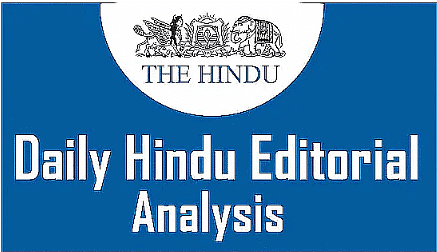The Hindu Editorial Analysis- 15th March 2024 | Current Affairs & Hindu Analysis: Daily, Weekly & Monthly - UPSC PDF Download

In Issuing AI Advisory, MEITY becomes a Deity
Why in News?
On March 1, the Ministry of Electronics and Information Technology (MeitY) issued an advisory to the Artificial Intelligence industry regarding generative AI products.
- The advisory stated that all such products, similar to large language models like Google's Gemini, must be made available with explicit permission of the Government of India if they are under-testing or unreliable.
- Government's Stand
- The advisory represents a significant shift in the government's approach to AI research and policy. It came shortly after Minister of State for Electronics and Information Technology, Rajeev Chandrasekhar, criticized Google's Gemini chatbot for queries if PM Narendra Modi was a fascist citing violation of India's IT law.
Key Takeaways from the Advisory
- The Ministry of Electronics and Information Technology (MeitY) issued an advisory to the AI industry about generative AI products like Google's Gemini.
- Products such as Google's Gemini must have explicit permission from the Indian Government if they are under-testing or unreliable.
- This advisory signifies a significant change in the government's stance on AI research and policy.
- Rajeev Chandrasekhar criticized Google's Gemini chatbot for potential violations of India's IT law, particularly regarding queries about PM Narendra Modi's political stance.
AI Model Testing Advisory Overview
- The advisory emphasizes the necessity of obtaining explicit permission from the Government of India before deploying under-testing or unreliable artificial intelligence models, generative AI, software, or algorithms on the Indian internet.
- It mandates that such technologies should only be made available to users after appropriately acknowledging and labeling the potential fallibility or unreliability of the generated output.
- Startup founders have strongly criticized this directive, labeling it as a discouraging and unfavorable step.
- Minister of State for Electronics and Information Technology, Rajeev Chandrasekhar, clarified that this directive does not extend to startups and is primarily intended for major platforms.
Key Points Explained
- The advisory underscores the significance of governmental consent before utilizing certain AI technologies in India.
- It stresses the importance of transparency regarding the limitations and potential errors of AI systems.
- Startup leaders have expressed discontent with the directive, considering it a setback for innovation.
- Rajeev Chandrasekhar clarified that startups are exempt from this requirement, which mainly targets prominent platforms.
Note: AI platforms are expected to operate without jeopardizing electoral processes or propagating misinformation.
Advisory on AI Models and Electoral Integrity
- Online platforms are required to ensure that their AI models do not allow users to post or host any illegal content specified under Rule 3(1)(b) of the information technology regulations.
- It is mandated that platforms must also guarantee that their "computer resources" do not exhibit bias, discrimination, or pose a threat to the integrity of the electoral process. This includes the use of artificial intelligence models, LLM, Generative AI software, or algorithms.
Explanation:
- According to the advisory, online platforms need to actively monitor and prevent users from sharing content that violates specific laws outlined in the information technology rules. For instance, any material falling under the prohibited categories detailed in Rule 3(1)(b) should not be permitted on these platforms.
- In addition, platforms are expected to oversee their computational resources to ensure that no instances of bias, discrimination, or activities that could compromise the fairness of the electoral process are present. This vigilance extends to the usage of advanced technologies such as AI models, LLM, Generative AI software, and algorithms. These tools should not be utilized in a manner that undermines the integrity of elections or promotes unfair practices.
Key Points from the Advisory on Synthetic Content and Misinformation
- The advisory emphasizes the importance of labeling or embedding synthetic content with unique metadata to curb the spread of misinformation and deepfakes.
- Platforms are urged to implement a consent popup mechanism to inform users about potential inaccuracies in AI-generated content.
Regulation Regarding Unlawful Information
- Users who engage with unlawful information on platforms may face consequences such as suspension or legal punishment.
Non-Compliance and Legal Consequences
- Non-compliance with IT Act and Rules could lead to penal actions, including prosecution under relevant laws.
Reception of the Advisory
The advisory has been well-received for its proactive approach in addressing the challenges posed by synthetic content and misinformation. By outlining specific measures for platforms to follow, it aims to enhance accountability and transparency in online content dissemination.
- Advisory Impact on Industry and Observers:
- The advisory from the Ministry has sparked debates within the industry and among observers regarding its nature - whether it serves as a mere reminder or a binding mandate.
- According to Prasanth Sugathan, Legal Director at the Software Freedom Law Centre in Delhi, the advisory appears to carry the weight of a mandate.
- Notably, the advisory directed major tech entities, including Google, to furnish a report detailing actions taken within a 15-day timeframe.
- Criticism and Legal Concerns:
- Legal experts, such as technology lawyer Pranesh Prakash, have raised objections to the advisory, deeming it legally questionable.
- They draw parallels between this advisory and the controversial Draft National Encryption Rules of 2015, which was swiftly retracted following public outcry.
- An area of contention lies in the lack of clarity on how existing IT regulations can be applied to automated AI systems within this context.
- Labeling Requirement for AI-Generated Imagery:
- The directive also pertains to the labeling standards for images generated by artificial intelligence.
Advisory on AI-Generated Imagery Labeling
- The advisory emphasizes the necessity for AI-generated imagery to be clearly labeled.
- There is a reluctance within the industry to actively pursue labeling efforts. For instance, Amazon Web Services experimented with an 'invisible' watermark but had reservations regarding its efficacy.
Calls for a Permissive Approach
- Legal expert Rahul Matthan advocates for a more permissive stance towards AI systems, underlining the advantages of fostering innovation.
- Matthan draws a parallel with the aviation sector, where the sharing of failure information has notably enhanced air safety protocols.
Government's Shifting Stance on AI Industry
- Previously optimistic about AI advancements, the government, led by Minister Chandrasekhar, now voices dissatisfaction with AI models producing inappropriate responses.
- This discontent has prompted a reevaluation of the regulatory approach towards artificial intelligence.
Impact on Local Developers
The evolving regulatory landscape concerning AI could have pronounced effects on local developers. For instance, stringent labeling requirements may alter how they create and deploy AI-generated content, potentially influencing their market competitiveness and innovation strategies.
|
63 videos|5408 docs|1146 tests
|
FAQs on The Hindu Editorial Analysis- 15th March 2024 - Current Affairs & Hindu Analysis: Daily, Weekly & Monthly - UPSC
| 1. What is the significance of MEITY issuing AI advisory? |  |
| 2. How does the AI advisory from MEITY impact the technology sector in India? |  |
| 3. What are some key takeaways from the AI advisory issued by MEITY? |  |
| 4. How does the AI advisory from MEITY address concerns related to data privacy and security? |  |
| 5. How can stakeholders in the technology sector in India adhere to the guidelines provided in the AI advisory from MEITY? |  |
















